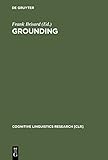Grounding : The Epistemic Footing of Deixis and Reference / ed. by Frank Brisard.
Material type: TextSeries: Cognitive Linguistics Research [CLR] ; 21Publisher: Berlin ; Boston : De Gruyter Mouton, [2012]Copyright date: ©2002Edition: Reprint 2012Description: 1 online resource (475 p.) : Num. figsContent type:
TextSeries: Cognitive Linguistics Research [CLR] ; 21Publisher: Berlin ; Boston : De Gruyter Mouton, [2012]Copyright date: ©2002Edition: Reprint 2012Description: 1 online resource (475 p.) : Num. figsContent type: - 9783110173697
- 9783110899801
- 415 21
- P165 .G76 2002eb
- online - DeGruyter
- Issued also in print.
| Item type | Current library | Call number | URL | Status | Notes | Barcode | |
|---|---|---|---|---|---|---|---|
 eBook
eBook
|
Biblioteca "Angelicum" Pont. Univ. S.Tommaso d'Aquino Nuvola online | online - DeGruyter (Browse shelf(Opens below)) | Online access | Not for loan (Accesso limitato) | Accesso per gli utenti autorizzati / Access for authorized users | (dgr)9783110899801 |
Frontmatter -- Acknowledgments -- List of contributors -- Table of contents -- Introduction: The epistemic basis of deixis and reference -- Deixis and subjectivity -- Remarks on the English grounding systems -- Part I: Nominal grounding -- Grounding, subjectivity and definite descriptions -- Interaction, grounding and third-person referential forms -- The French imparfait, determiners and grounding -- Deictic principles of pronominals, demonstratives, and tenses -- Part II: Clausal grounding -- The meaning and distribution of French mood inflections -- The English present -- The preterit and the imperfect as grounding predications -- A cognitive grammar analysis of Polish nonpast perfectives and imperfectives: How virtual events differ from actual ones -- “Wieso sollte ich dich küssen, du hässlicher Mensch!” A study of the German modals sollen and müssen as “grounding predications” in interrogatives -- Grounding and the system of epistemic expressions in Dutch: A cognitive-functional view -- Subject index -- 477-478
restricted access online access with authorization star
http://purl.org/coar/access_right/c_16ec
This compilation of invited contributions, gathering an international collection of cognitive and functional linguists, offers an outline of original empirical work carried out in grounding theory. Grounding is a central notion in cognitive grammar that addresses the linking of semantic content to contextual factors that constitute the subjective ground (or situation of speech). The volume illustrates a growing concern with the application of cognitive grammar to constructions establishing deixis and reference. It proposes a double focus on nominal and clausal grounding, as well as on ways of integrating analyses across these domains.
Issued also in print.
Mode of access: Internet via World Wide Web.
In English.
Description based on online resource; title from PDF title page (publisher's Web site, viewed 28. Feb 2023)


